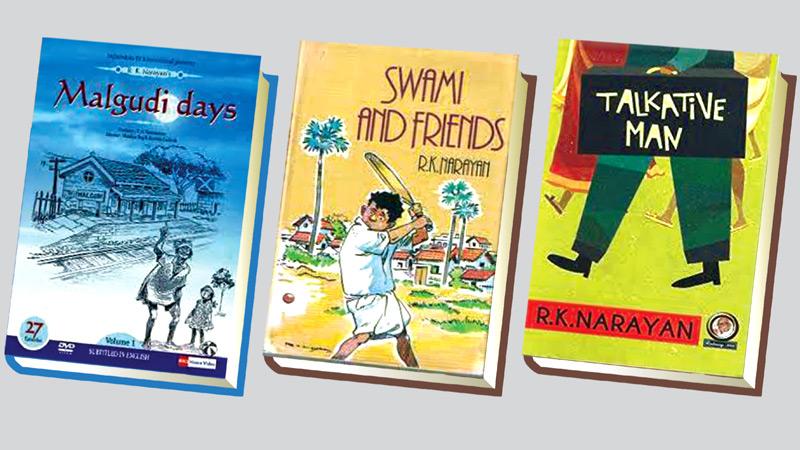
“In a world where we are accustomed to rivalries over possession, authority and borders, and people clashing over the issue, “Ours,” or “Mine, not yours,” it is rather strange to find two people debating whose the kingdom is not, and asserting: “Yours, not mine.” — R.K. Narayan
 R. K. Narayan’s literature evokes the essence of old Indian culture through the fragments of his stories. Malgudi Days is one of his excellent pieces of literature cherished by readers of all time. The stories formed around the fictional village of Malgudi are yet living inside the hearts of the readers. Narayan could bring the simplicity of Hindu lifestyles through his anecdotes which conveyed bits and pieces of everyday life.
R. K. Narayan’s literature evokes the essence of old Indian culture through the fragments of his stories. Malgudi Days is one of his excellent pieces of literature cherished by readers of all time. The stories formed around the fictional village of Malgudi are yet living inside the hearts of the readers. Narayan could bring the simplicity of Hindu lifestyles through his anecdotes which conveyed bits and pieces of everyday life.
In the series Swami and Friends, Narayan brought nostalgic childhood memories through the protagonist’s innocence, mischief and sweetness. In the story of Vendor of Sweets, Narayan reflects how colonialism influenced the lives of people. Likewise, Narayan depicted the beliefs, myths, poverty, class disparity, family ties, humility, generosity, piousness, life struggles from his narratives of all kinds from old Indian society.
Rasipuram Krishnaswami Iyer Narayanaswami is well known as R. K. Narayan lived a legacy and still, his imprints live through his literature. Born in 1906, Narayan experienced political events, rebellions, movements initiated as a result of colonialism. The hierarchy of society is most explicit through his stories. Along with he could bring friction between western ideologies and Hindu tradition. Narayan’s every single masterpiece of literature able to capture the authentic Indian culture with zero distortion. His collections of books are more likely a time-traveling machine that takes the reader to all phases of the 20th century.
Stepping into literature
The early years of Narayan’s life helped him grow his taste in art and literature. Being a young man, he aspired to step into higher education, but he failed his university entrance examination twice. However, he turned the two-year respite into benefit himself by enriching his knowledge of literature and his muse towards nature. Soon after he gained admission to Maharaja’s College, Mysore, he wrote his debut short stories. After graduating in 1930, he initiated his career as a teacher, but he resigned after four days. Later in September 1930, he let his literary abilities show up. He could write stories around his fictional Malgudi village. “I am a treacherous writer when I move out of Malgudi,” he remarked in 1995, as he finished writing Malgudi stories which, he considered as a pivotal moment in his writing life. Narayan’s parents’ love and support lie behind his long journey. They were sharp enough to believe in the value of education and the freedom to have a liberal perspective on life despite orthodoxy.
Fictional world
Narayan’s all kinds of literary masterpieces are powerful enough to grasp the reader’s attention by his strong visual imagery technique. The visual imagery depicted in his work assures how eloquent, green landscapes of Mysore fascinated him. Diving deep into his literature, we find that most of his works influenced by folk tales.
His grandmother enriched him with folk-tales, which she could have related through fluent narrative style. Narayan’s appreciation of south Indian classical music has roots in his grandmother’s teachings. Narayan had even more knowledge on classical Tamil literature and Shakespearean literature from his uncle.
His writing styles fuse with comic with the tragic while leading the end to a philosophical depth. The lucid style of his writing aligned with the rhythms of Indian life that made it accessible to people of other cultures. In addition, the various characters that he brought into life and their moral predicaments always took a universal angle.
Excellence
Narayan was honoured with the Indian Sahitya Akademi Award, the Royal Society of Literature’s Arthur Christopher Benson Award. In 1964, he received the Padma Bhushan, the country’s highest civil honours. For his commitment to the nation’s culture in 1985, he was nominated to India’s upper house, the Rajya Sabha, in which he strived to ensure the future of India’s children and preservation of nature during a six-year term. He was also nominated for Nobel Prize for Literature.
